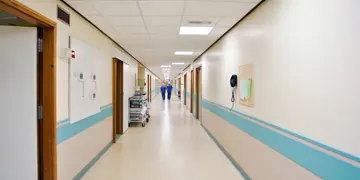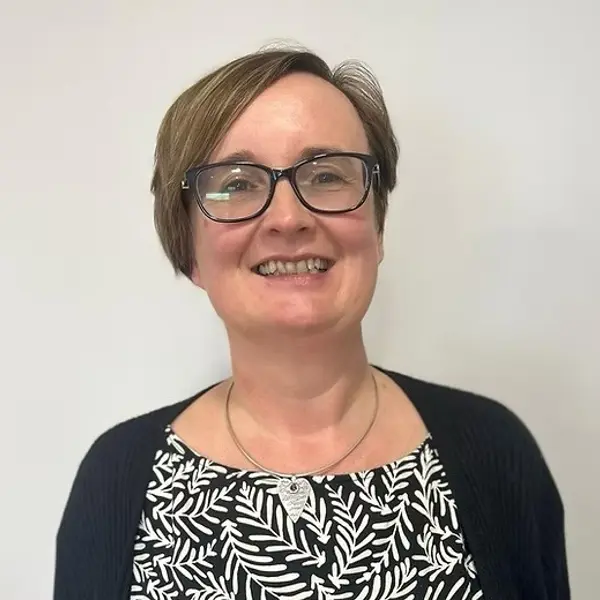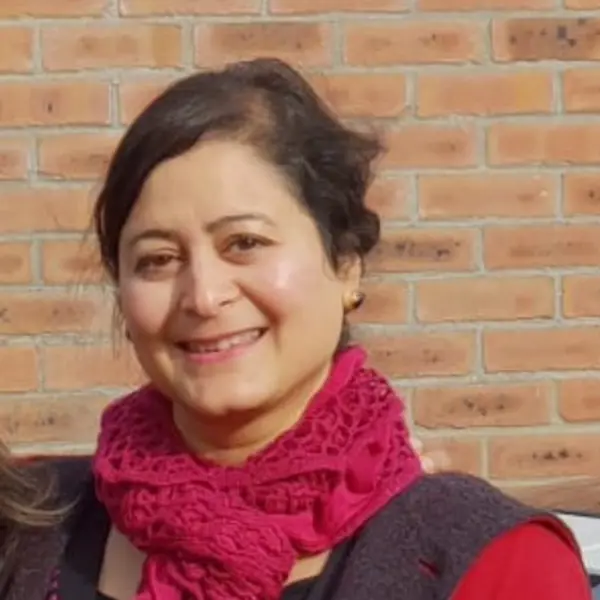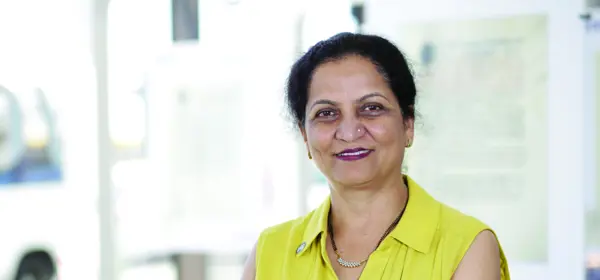A quest for recognition
A quest for recognition
SAS doctors can often 'go under the radar'. As a week celebrating their achievements comes to a close, three of them tell Tim Tonkin about the opportunities and challenges they have had, and why it's important to 'create visibility'
‘I always said to myself: “Why not? Why can’t I do it?”’
For Madapura Shashidhara, becoming a specialist, associate specialist and specialty doctor proved to be the key to unlocking many important achievements in his long career.
Born into a large family in Karnataka state in southern India, most of Professor Shashidhara’s relatives became either teachers or engineers.
Although initially drawn to IT and computer science, a life-long interest in life and the natural world meant that Prof Shashidhara ultimately became the first doctor in his family.
‘I remember talking with my father and him saying that “whatever career you choose, choose something which you enjoy for the rest of your life”, recalls Prof Shashidhara.
‘I was fascinated by how life evolved and how things function that’s why I said I wanted to go and do medicine.’
After gaining his medical qualification and working for several years in a missionary hospital and teaching at a medical school in Bangalore, Prof Shashidhara was persuaded to relocate to the UK for a new challenge, arriving in Liverpool in 1997.
Finding his feet in the NHS and settling in Hertfordshire, Prof Shashidhara became a staff grade doctor in 2002.
After joining the BMA Eastern regional SAS committee and becoming the first SAS member of his then trust’s joint local negotiating committee, Prof Shashidhara said he encountered obstacles to participation.
After initially being told he could not attend departmental meetings as a staff grade doctor, Prof Shashidhara successfully challenged this decision in a move that set the tone for the rest of his career.
‘I went and went back to the clinical director and, with all due respect, explained that there are 12 of us [SAS doctors] in this department and we can represent our own views,’ recalls Prof Shashidhara.
‘I started going to department meetings, even then I would only be there for the first 15 minutes then I was asked to go out, which I found very, very strange.’
I always said to myself 'Why not? Why can't I do it?'
Madapura Shashidhara
Moving to the north-west of England in the mid-2000s, Prof Shashidhara finally gained the opportunity to apply to become an associate specialist in 2008.
It was a step-up that allowed him to explore new possibilities in his clinical career, including the opportunity to utilise his computing skills to develop an algorithm-based program designed to help reduce operation cancellations.
The program, which later saw Prof Shashidhara with a runner-up prize in an innovation award run by the Association of Anaesthetists, is still in use at his trust.
As well as innovation, Prof Shashidhara has also sought to prove how SAS doctors can effectively take on leadership roles having been appointed a perioperative anticoagulation lead at his trust and serving as a SAS tutor since 2012.
He was also tasked with increasing recruitment of staff from overseas and co-developed an international training fellowship scheme which has helped to support dozens of international medical graduate doctors gain experience in the NHS.
As an associate specialist, Prof Shashidhara has also sought to improve the recognition of SAS doctors by addressing shortcomings in medical coding, which frequently sees clinical work primarily carried out by SAS doctors being attributed to a supervising consultant in medical records.
‘Patient care is the result of teamwork, and we all work in teams, but there will be a leader,’ explains Prof Shashidhara.
‘What we did was in Stockport was we created a local governance structure for the SAS doctors, what work they have done and what can be accountable to their name. We then we try to code them using the GMC number to the national NHS digital dictionary.’
As a strong advocate for raising the profile of the SAS grades, Prof Shashidhara says that while he believes nationwide initiatives such as SAS week play an important role, the mindset of individual SAS doctors wanting to stand up and be counted is also pivotal.
‘I always said to myself “Why not? Why can’t I do it?”’, he reflects.
‘I believe the SAS week is about giving exposure to grassroots SAS doctors who are hidden, who are working in silos, and to tell the trust: “these are your SAS doctors. Look what they are doing”’, he adds.
‘If you don’t create visibility you’ll be forgotten, and you won’t be recognised.’
Family achievement
Much like Prof Shashidhara, Joanne Younge was the first person in her family to enter the medical profession, driven by an interest in science, particularly biology and the human body, from an early age.
After qualifying, Dr Younge explored a range of specialties including geriatric medicine and obs and gynae and for a time considered becoming a GP.
Much to her own surprise, however, she ultimately settled on pursuing a career in old age psychiatry.
‘I hadn’t considered psychiatry as an option at all when I was a medical student but when I got into it, I found that I was good at connecting with people, helping to find out what made people tick and what could help them to get better,’ she explains.
‘Old age psychiatry was the ideal balance for me, because there’s kind of a convergence of both physical and mental health, and it challenges that false dichotomy that physical health and mental health are separate things.’
It was following her return from maternity leave that she began to take stock of her options and was to discover her eventual career path while on break at her hospital’s canteen where she encountered a type of doctor she had hitherto never heard of.
‘I met a staff grade doctor which was a grade I'd never heard of at the lunch table in a canteen in hospital one day,’ Dr Younge reflects.
‘[The more I learned] the more it really seemed to me to be the ideal job in terms work life balance, geographical stability and the opportunities to develop my own special interest and niche.’
After securing a staff grade role in old age psychiatry in 2003, Dr Younge later became an associate specialist following the introduction of the 2008 contract.
Being a SAS doctor allowed Dr Younge the flexibility to complete a postgraduate CBT diploma and then masters in cognitive behavioural psychotherapy, later going on to work in an academic capacity supporting the CBT training programme at Queen’s University Belfast.
As an associate specialist, Dr Younge was also instrumental in setting up a CBT-based psychological therapy service aimed at older patients – the very first of its kind in Northern Ireland.
Her career path has also enabled her to effect change at a national level through the development and implementation of a lithium care pathway to improve patient safety which was cited as an example for shared learning by the National Institute for Health and Care Excellence.
Despite these achievements, Dr Younge says that, as a SAS doctor, she has all too often encountered obstacles to developing her skills and has had to fight to be appropriately recognised or have sufficient access to entitlements such as supporting professional activities time.
‘At times in my career I’ve felt like Schrödinger’s doctor,’ remarks Dr Younge.
‘Being simultaneously completely essential to the service and able to manage complex cases or cover consultants and, at the same time, not being seen as senior enough to be a decision maker or involved in service plans and service design.'
Partly in response to these issues around visibility and recognition, Dr Younge alongside others founded the SAS collective, an online coalition of doctors from across the UK united by the common goal of wanting to improve the careers and retention of SAS doctors, during the national SAS week of 2023.
The collective has since gone from strength to strength with 10 trusts and 12 national organisations, including the Royal College of Paediatrics and Child Health, having professed support for its aims.
Within her own trust, Dr Younge, as the first SAS lead, also used the 2022 SAS week to launch an initiative called 'the SAS doctor star', which aims to acknowledge and celebrate the work of SAS staff. The awards have since seen more than 100 nominations per year submitted from across the trust’s workforce.
‘I think it is really important and good that the BMA and NHS employers have developed a national SAS week because I really do think that SAS often go under the radar and just get on with things and aren’t necessarily recognised in the way that they should be.’
New beginnings
‘If there is good support, then you’re motivated and you get opportunities.’
When she first arrived in the UK back in 1996, Geetanjali Ratnalikar admits that she felt a little overwhelmed by what was to become her new home.
With a five-year-old in tow and four months pregnant with her second child feeling jetlagged having flown in from India, Dr Ratnalikar found herself in a country she had never before visited.
Almost 30 years on, the smallest details from that time still stand out in her memory.
‘My husband was taking driving lessons here when I arrived with the little one,’ Dr Ratnalikar laughs.
‘He had convinced the driving instructor to come to the airport to pick us up. It was a wet, rainy, grey day in Manchester, and I remember for our first meal we ended up just having cornflakes and milk.’
Alongside her anaesthetist husband, Dr Ratnalikar had come to the UK on an overseas doctor scheme, with the couple initially settling in Stafford before moving to Swansea.
Following maternity leave and as yet unregistered to practise medicine, Dr Ratnalikar completed an observership before completing a training programme sponsored by the Welsh deanery and then later a diploma in practical dermatology.
Having initially considered entering general practice, Dr Ratnalikar ultimately became a specialty doctor. One of her earliest achievements in this role was establishing a patch test service at her trust.
‘One of the consultants then encouraged me to develop this as there was no patch test service there at that time,’ she recalls.
‘I was happy to develop myself in this kind of niche and did some training for almost seven months, visited different departments and learned about patch testing from the lead consultants.
‘I was then able to start patch testing service from the scratch and from a service that was not existent before, I soon had 300 patients.’
Outside of her clinical work, Dr Ratnalikar sought to advocate for fellow SAS doctors whenever possible. She spent three years serving on the British Association of Dermatologists' SAS sub-committee and was a representative of SAS doctors on Welsh dermatology forum.
Since 2021, she has worked as a SAS tutor at Swansea Bay University Health Board and recently staged a learning event on the role of AI in medicine.
‘I think opportunities are there in whatever role, whichever role you are in, but being able to take those opportunities is the key,’ explains Dr Ratnalikar.
‘Support matters for SAS doctors, because we still considered as just “service providers”. If there is good support, then you’re motivated and you get opportunities.
‘If employers are supporting us, we want to develop ourselves and, in doing so, we can make a huge difference.’





